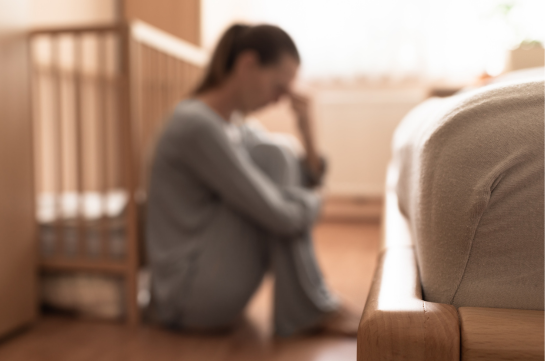The basics of postpartum depression
A lot of things change after giving birth. As a new parent, you’re dealing with hormone surges and differences in your body, not to mention balancing your old responsibilities with a new little person in your life.
In this time of transition, many new parents deal with depression, although they may struggle to identify it or seek help. Some people feel a sense of shame over not fitting the “perfect” image of parenthood. But acknowledging postpartum depression is not shameful—in fact, reaching out and seeking help is one of the bravest things you can do.
The bottom line is that depression is a disease that impacts the functioning of your body and brain. Just like with a broken bone, waiting for it to improve on its own is often not enough. You deserve support from your doctors and your community, and Welia Health is here to help.

New mom taking a moment to herself
You’re not alone
Postpartum depression—sometimes also called Perinatal Mood and Anxiety Disorder (PMAD)—is much more common than you might think, affecting one out of five mothers.
While there are some factors that may increase its likelihood—including past depression, lack of social support, family history, difficulty getting pregnant, and pregnancy complications—it can happen to anyone. People with more significant societal stressors, such as being under age 20, low-income, or non-white, are also at higher risk.
Many people think about postpartum depression as something that impacts new mothers shortly after birth. While that is a common situation, it doesn’t represent the whole picture. Depression can develop at any point in the baby’s first year, or even in the months before the baby is born. And postpartum depression doesn’t only impact the birthing parent. Studies have shown that fathers and non-birthing partners can suffer the same condition with many of the same effects.
Dealing with depression is not a character flaw and it doesn’t mean you’re not a good or resilient parent. It’s just another possible complication of having a baby, and prompt and effective treatment can help you and your baby thrive.
Is it “baby blues”?
Most new mothers deal with the so-called “baby blues”—a sense of being overwhelmed reflected in trouble sleeping, anxiety, crying, and mood swings in the first few weeks after birth. While the baby blues are distressing, they typically resolve on their own within two weeks.
Unlike baby blues, postpartum depression doesn’t go away on its own and can prevent new parents from building a normal routine. It can also impact a parent’s relationship with the baby, making it difficult to connect and care for the infant.
Symptoms to watch for that may indicate postpartum depression include:
- Feeling sad, anxious, or empty most of the time
- Severe mood swings
- Exhaustion and lack of energy
- Changes in eating patterns
- Changes in sleeping patterns
- Feeling guilty, hopeless, or worthless
- Feeling moody or irritable
- Struggling to concentrate or make decisions
- Thoughts of hurting yourself or your baby
- Anxiety or panic attacks
- Withdrawing from family and friends
- Thoughts of death or suicide
If you are experiencing these symptoms, it can feel like there’s no way out. But you are not alone in your experience. There are proven, effective treatments for postpartum depression, and together, we can work to help you recover.
Your community is here for you
It is never wrong, embarrassing, or unnecessary to seek help. If you have any concerns about your mental health after pregnancy, we’re here to listen. You can reach Welia Health at 320.225.3625 to schedule an appointment with your provider. Other local resources can be found here: Postpartum Recovery
If it’s an emergency, don’t hesitate to call an emergency support line like the National Maternal Mental Health Hotline at 1.833.TLC.MAMA (1.833.852.6262), the 988 Suicide and Crisis Lifeline, or 911. Non-emergency helplines are also available, including the Mother-Baby HopeLine at 612.873.HOPE (612.873.4673) and the Pregnancy & Postpartum Support Minnesota line at 1.800.944.4773.
Your doctor will work with you to figure out a way forward—and you have plenty of options. You may choose to meet with a therapist, either alone or with a support group. Many medications have been proven to work safely and effectively for new and breastfeeding mothers. Your provider can connect you with further resources on postpartum depression.
Help is also available elsewhere in your life. If you’re religious or spiritual, it may be helpful to connect with a faith leader. Many of us struggle to ask for help, but being a good parent means asking for the support you need from your community. Reach out to family and friends and share with them what you’re going through, or delegate daily tasks to relieve some of the pressure. As always, try to focus on the basics: get enough rest, drink enough water, eat a balanced diet, and move your body.
There are plenty of reasons why new parents may struggle to reach out. Some people fear stigma, abandonment, or lack of support—or they simply want to keep their private life private. But postpartum depression often won’t go away without help.
At Welia Health, we’re committed to bringing our skill and experience to meet you where you are. Working together with you, we will come up with a plan of care that’s tailored to your circumstances. Call our office at 320.225.3625 to speak to our team about postpartum depression—and remember, you aren’t in this alone.

